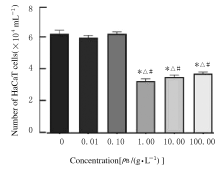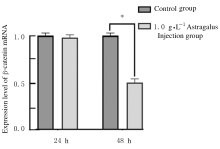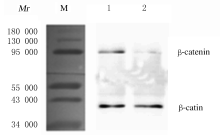| 1 |
中华医学会皮肤性病学分会银屑病专业委员会.中国银屑病诊疗指南(2018完整版) [J]. 中华皮肤科杂志,2019,52(10):667-710.
|
| 2 |
BISSONNETTE R, NIGEN S, LANGLEY R G, et al. Increased expression of IL-17A and limited involvement of IL-23 in patients with palmo-plantar (PP) pustular psoriasis or PP pustulosis; results from a randomised controlled trial[J]. J Eur Acad Dermatol Venereol, 2014, 28(10): 1298-1305.
|
| 3 |
MEASE P J, MCINNES I B, KIRKHAM B, et al. Secukinumab inhibition of interleukin-17A in patients with psoriatic arthritis[J]. N Engl J Med, 2015, 373(14): 1329-1339.
|
| 4 |
AYALA-FONTÁNEZ N, SOLER D C, MCCORMICK T S. Current knowledge on psoriasis and autoimmune diseases[J]. Psoriasis (Auckl), 2016, 6: 7-32.
|
| 5 |
HAMPTON P J, ROSS O K, REYNOLDS N J. Increased nuclear β-catenin in suprabasal involved psoriatic epidermis[J]. Br J Dermatol, 2007, 157(6): 1168-1177.
|
| 6 |
龙剑文, 皮先明, 涂亚庭. 进行期寻常性银屑病皮损β-连环蛋白、VEGF和VEGFR-2的mRNA表达[J]. 中国皮肤性病学杂志, 2015, 29(1): 29-31.
|
| 7 |
包七十三. 黄芪注射液联合阿维A治疗银屑病的疗效[J]. 中国冶金工业医学杂志, 2016, 33(1): 40-41.
|
| 8 |
李 玲. 黄芪注射液对寻常型银屑病患者微循环及氧化应激状态的影响研究[J]. 世界中西医结合杂志, 2015, 10(7): 962-964.
|
| 9 |
王 辉, 石永强. 黄芪颗粒联合益生菌治疗溃疡性结肠炎的疗效及对IL-23、IL-17的影响[J]. 中国地方病防治杂志, 2016, 31(10): 1171.
|
| 10 |
刘丹莉, 刘海英, 高顺利. 黄芪甲苷通过IL-23/IL-17信号通路对病毒性心肌炎的干预作用探讨[J]. 临床儿科杂志, 2014, 32(6): 570-573.
|
| 11 |
GAO Y, ZHANG R R, LI J H, et al. Radix Astragali lowers kidney oxidative stress in diabetic rats treated with insulin[J]. Endocrine, 2012, 42(3): 592-598.
|
| 12 |
杨 凡, 谭正怀, 艾儒棣, 等. 黄芪治疗湿疹的相关机制探讨[J]. 中国民族民间医药, 2018, 27(23): 16-19.
|
| 13 |
张玉芳, 甄 莉. 黄芪注射液对寻常型银屑病皮损角质形成细胞增殖细胞核抗原表达的影响[J]. 中国药物与临床, 2011, 11(10): 1150-1152, 1233.
|
| 14 |
何 金, 赵恒光, 任先志, 等. 黄芪注射液对Balb/c裸鼠银屑病模型的皮损程度及Caspase-14、SOCS1、STAT3水平的影响[J]. 海南医学院学报, 2019, 25(6): 410-413.
|
| 15 |
沈立飞, 王海英. 黄芪注射液联合阿维A、复方氟米松软膏对银屑病患者外周血细胞因子的影响[J]. 中国老年学杂志, 2016, 36(14): 3546-3547.
|
| 16 |
李 玲. 黄芪注射液对寻常型银屑病患者微循环及氧化应激状态的影响研究[J]. 世界中西医结合杂志, 2015, 10(7): 962-964.
|
| 17 |
黄志雄. 黄芪注射液联合阿维A治疗老年银屑病的临床效果[J]. 现代诊断与治疗, 2015, 26(6): 1274-1275.
|
| 18 |
闫铁夫. 黄芪注射液联合阿维A对小鼠银屑病模型的影响[J]. 重庆医科大学学报, 2013, 38(1): 58-60.
|
| 19 |
闫铁夫. 黄芪注射液联合阿维A治疗银屑病的疗效[J]. 中国老年学杂志, 2012, 32(12): 2518-2520.
|
| 20 |
李 雪, 解欣然, 李宁飞, 等. 凉血解毒利湿方对小鼠银屑病样皮损中过氧化物酶体增殖激活受体的影响[J]. 中医杂志, 2017, 58(23): 2032-2038, 2073.
|
| 21 |
邢 倩. β-catenin和Dickkopf1在银屑病皮损中的表达[D]. 重庆:重庆医科大学, 2012.
|
| 22 |
刘国刚, 熊 霞. Wnt/β-catenin信号通路与银屑病相关性研究进展[J]. 西南军医, 2012, 14(1): 109-110.
|
| 23 |
吴发宝, 陈希元. 黄芪药理作用研究综述[J]. 中药材, 2004, 27(3): 232-234.
|
| 24 |
李炎夏,周起云,陆王景学,等. 黄芪维胺酯联合应用对银屑病甲襞微循环的影响[J]. 中国皮肤性病学杂志, 1998, 12(6): 3-5.
|
| 25 |
HUH J E, NAM D W, BAEK Y H, et al. Formononetin accelerates wound repair by the regulation of early growth response factor-1 transcription factor through the phosphorylation of the ERK and p38 MAPK pathways[J]. Int Immunopharmacol, 2011, 11(1): 46-54.
|
| 26 |
HAN D O, LEE H J, HAHM D H. Wound-healing activity of Astragali Radix in rats[J]. Methods Find Exp Clin Pharmacol, 2009, 31(2): 95-100.
|
| 27 |
韩 丹,王 博,王丽娟,等.IL-22可诱导角质形成细胞双调蛋白表达促进银屑病发病[J].西安交通大学学报(医学版),2019,40(6):981-985.
|
| 28 |
赵春苗,楚燕芳,张冰莹,等.双重滤过血浆置换疗法治疗银屑病关节炎2例并文献复习[J].中国实用内科杂志,2019,39(12):1105-1108.
|
 )
)









